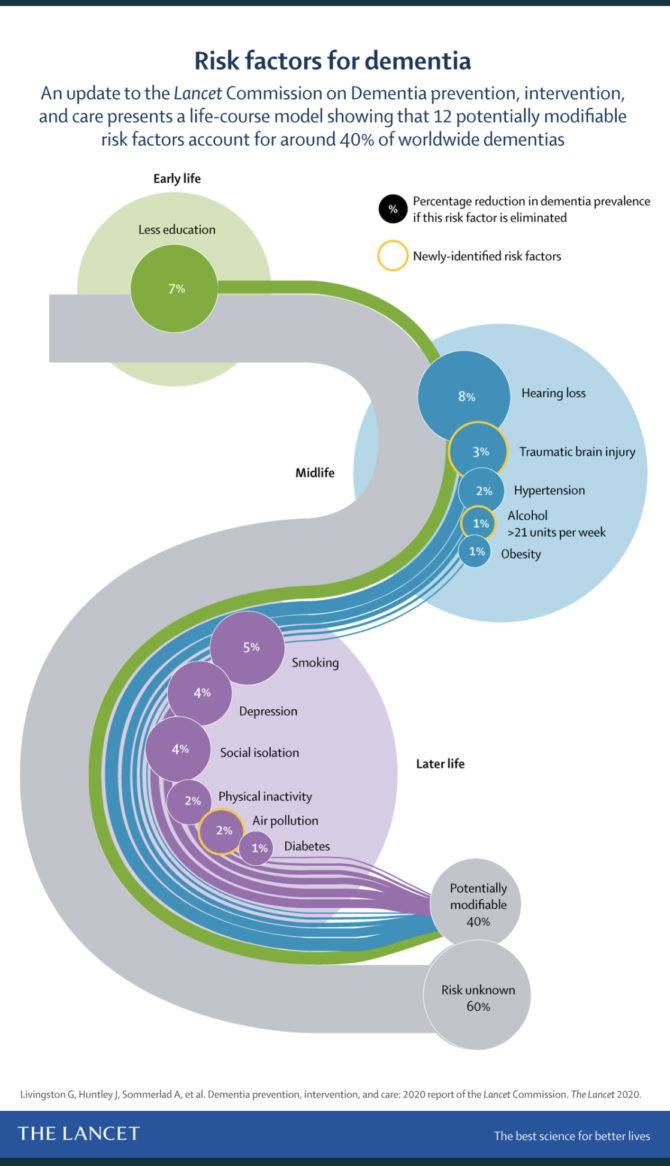
Dementia Prevention and Hearing Loss.
The Lancet Commission this week published its long-awaited update: “Dementia Prevention, Intervention, and Care: 2020”.
The report’s eminent authors carried out a systematic review (meta analysis) of all the available research studies and evidence base citing 315 references in a far-reaching 34-page document. The commission has increased its list of risks associated with cognitive decline and memory loss (as detailed in its 2017 report) from nine… to twelve. Crucially, the commission stated these risks can be modified and reduced by changes in behaviour, education, and lifestyle.
At the forefront of the list is hearing loss and, crucially, the importance of the early adoption of hearing treatment technology (aka hearing aids).
The report’s conclusions regarding hearing make sober reading.
The risk of developing cognitive and memory impairment is increased for anyone with reduced hearing thresholds but NOT those who wear hearing aids.

The report states:
“A 25-year prospective study of 3777 people aged 65 years or older found increased dementia incidence in those with self-reported hearing problems except in those using hearing aids. Similarly, a cross–sectional study found hearing loss was only associated with worse cognition in those not using hearing aids. A US nationally representative survey of 2040 people older than 50 years, tested every two years for 18 years, found immediate and delayed recall deteriorated less after initiation of hearing aid use, adjusting for other risk factors. Hearing aid use was the largest factor protecting from decline (regression coefficient β for higher episodic memory 1·53; p<0·001) adjusting for protective and harmful factors. The long follow-up times in these prospective studies suggest hearing aid use is protective, rather than the possibility that those developing dementia are less likely to use hearing aids. Hearing loss might result in cognitive decline through reduced cognitive stimulation.”
The full report can be found here HERE
Dementia, Prevention and Hearing Loss – a view from Hearing Healthcare Practice
As audiologists dedicated to best practice, one of the most challenging tasks we are faced with is interpreting research data from studies and explaining its relevance to our patients and clients in an easy-to-digest form. It’s not always a simple task, but our intention will always be to draw on the evidence and to provide a solid scientific base to engage in conversations about the therapeutic benefit of wearing hearing aids. There are a multitude of reasons why we may listen to, but not follow, the advice of professionals. We all know we must watch what we eat, drink less and exercise more for our well being. But for many (please excuse the irony), professional advice falls on deaf ears!
But, in this case, please to listen to and follow this Dementia, Prevention and Hearing Loss advice:
- If you have hearing technology/hearing aids languishing in a drawer, please take them out, clean them up and put them on! If they don’t work, visit your audiologist and seek further support.
- If, now that everyone is talking behind a face mask, you have come to realise that you’re struggling to understand easily… perhaps you have been relying on lip reading… and covering up the fact you should be seeking professional help for improved hearing? Speak to an audiologist.
- If you have taken to Zoom and other video platforms and can’t understand clearly, you should seek the advice of an audiologist.
- If you have not been hearing as well you know you should and just putting off the inevitable conversation for another day, please speak to an audiologist.
- If your television is louder than others around you find comfortable, speak to an audiologist
- If you have strained to understand in background noise, please speak to an audiologist.
In the past, we have seen some organisations hijack study data to use as a ‘sales tool’. This is certainly not the case here – and we hope independence and clear recommendations of this Lancet report make that very clear.
Our mission is to educate, inform, intervene and to mitigate the risk of isolation and withdrawal (both associated with hearing challenges). As mental health is high on our agenda these days – especially following the isolation we’ve all had to endure over the past few months – we are compelled to share this important information .
We do this in the hope you can make an informed decision whether your sense of hearing – and ability to interact with others – requires the attention we believe it should.